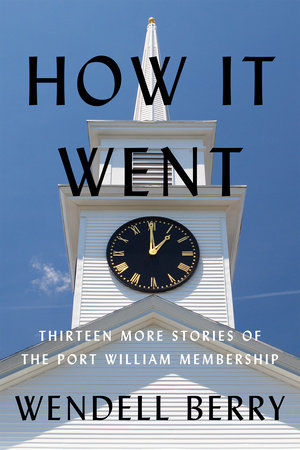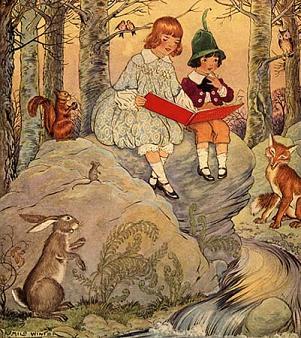Book Review: How It Went
As I read Wendell Berry’s latest collection of short stories How It Went: Thirteen More Stories of the Port William Membership, I thought often of a passage from his Memory of Old Jack. Written almost 50 years ago, it describes the young Andy Catlett as he approaches Old Jack Beechum, who sits on the porch reflecting on his life:
As he crosses the road, Andy is aware as always that he approaches a past much older than his own, that he cannot remember. But it is a past that, listening to Old Jack’s and his grandparents’ talk, he can enter with his imagination. And in that way he has taken possession of it. Since boyhood he has been Old Jack’s listener, the student of his memory. And there has come to be a part of his mind that is spacious and old, hung with the elaborately interconnecting web of Port William lineages, containing landscapes changed beyond recognition years before his birth. . . .
Wendell Berry, The Memory of Old Jack (1974)
As I read How It Went, I felt that I was in the young Andy’s shoes, a listener and student of memory. But in this collection, the narrator is “Old Andy” (as he calls himself), the character in whom the wall between Berry’s fiction and his personal perspective seems so thin as to be almost transparent.
Like Old Jack’s conversation, these tales range across Port William lineages and landscapes, territories we’ve accessed through imagination for many years now. The stories seem to capture significant moments in the shaping of Andy’s mind, moments that have lasted in memory and are elaborated here, and pondered: satisfying work days; an extended chase through treetops in pursuit of a young squirrel; a ramble through the woods that leads to a small farm, harmoniously laid out and lovingly tended; exultation about the ending of World War 2, now overshadowed in memory by the knowledge of how it also marks the point at which rural communities and agriculture began to change.
Several of the stories are striking for their sense of solitude. They feature the boy Andy alone in the woods and streams, but not lonely. My own childhood gave me many such times in the woods behind our house, unstructured times to explore and observe and imagine. But I wonder how many of today’s children ever get the truly “free range” experience, and how their lives are affected as a result. The world of Andy’s youth, while not what you’d call sheltered, was safer in some respects. Andy’s solitary, unmediated experience outdoors seems key to his sense of belonging to, and caring for, his place.
In an interesting contrast, one story (“Dismemberment”) focuses on the adult Andy’s loss of his right hand to a corn picker, an event also recounted in the novel Remembering. In the past, I’ve thought of this as a way of depicting a broken, or compromised, connection to nature, brought about by machines. But actually Andy’s hand is his point of contact with the world in general — the natural world, other people, writing. It is replaced with a prosthetic hand, and he also learns to do things with his other hand. I find myself wondering about this. Aside from Remembering, Andy’s lost hand hasn’t figured into any other stories. Although Berry resists having his work analyzed to death, there seems to be no other purpose for Andy’s prosthetic hand than symbolism. How are we to understand this injury? I don’t know, other than that it enforces a handicap or interruption of some kind between Andy and the world. In the story, the membership supports and helps him through the transition, suggesting the human community is key to his healing.
In general, the stories felt more loosely plotted than others by Berry, which may be why I felt more than once that I was in the young Andy’s position when he listens to Old Jack recounting his life. I hate to say it, but it felt rambling at times: “Where is this going?” The author revisits familiar themes: good work; what it means to farm well; the deep love and care among family, friends and neighbors; memory and the passage of time; race. But over it all is an unmistakable — grief? worry? I don’t know the best word — from the awareness of a lost inheritance of knowledge and practice. In other stories, the neighbors who work together in the farms and tobacco fields of Port William seem a more vital part of Andy’s daily life, but here they are often discussed in memory; Andy seems more isolated. He has grown old, and part of this means outliving people. But unlike earlier generations when younger participants in the “membership” were there to step in and continue the pattern, the younger farming population has left.
We see a progression in the stories as we move forward in time, particularly in the quality of work that’s depicted. I’m thinking of three stories in particular: In “A Conversation,” Andy remembers his experience as a young boy working with Dick Watson, a master workman and instructor credited with major influence in Andy’s perspective and skill. In “One Nearly Perfect Day,” Andy is around 12, and Wheeler puts him in semi-charge of two rather lazy hired hands with low standards of workmanship while the three rebuild a fence. Finally, in “The Art of Loading Brush,” Old Andy hires some incompetent men to rebuild a fence rather than asking for help. Each story marks a diminishing in the quality and togetherness of workmanship.
Without question, this collection is tinged with loss. The “it” of the title might initially suggest the book will simply recount how life has been going in Port William since the last installment, but it actually documents how a way of life (“it”) has all but disappeared. In “The Great Interruption,” which has the potential to be simply a rollicking tale, Andy reflects on how even certain stories can be lost or become untellable when the shared memory of a place changes. But Berry has written for sixty years about Port William, and he’s prepared the ground well by preserving its history and stories against uncomprehending listeners. Spun out with characteristic wit, and tempered with moments of almost unbearable beauty and tenderness, the stories in How It Went are worth telling. The collection seems to formalize a passing of the torch from Old Jack to Old Andy as the keeper of the past, and to invite readers to continue Berry’s long work of preservation in our choices about how to work, relate and live.






2 Comments
Amy
Hi Janet!
I was cleaning out my decades-old bookmarks and came upon your blog. I am so pleased you’re still writing here. Life has a way of carrying us along, doesn’t it? I’m working full time now (as my city’s public library’s children’s librarian–new position as of the end of December!). Anyway, I just wanted to say hi.
Amy
Janet
Great to hear from you, Amy! Your job sounds wonderful. I sent you a message. :-)